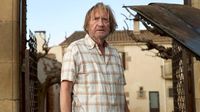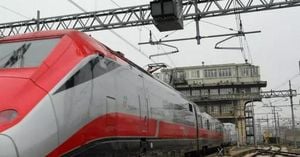On April 17, 2025, viewers tuned in to the latest gripping installment of "Der Barcelona-Krimi" titled "Brennendes Land," which aired on Ersten. This German production, directed by Andreas Kleinert, dives deep into a murder mystery set against the backdrop of a severe drought affecting Catalonia. The film opens with the discovery of Ernesto Quintana (played by Daniel Sellier), a prominent lawyer for the water company "Baraqua," found dead in a pond on the extravagant golf course owned by real estate mogul Moreno Boverla (Johannes Terne).
The plot thickens when the managing director of Boverla, Jordi Casanueva (Louis Nitsche), refuses to provide surveillance footage from the golf course to the investigating officers, Xavi Bonet (Clemens Schick) and Fina Valet (Anne Schäfer). This initial resistance raises eyebrows and sets the stage for a complex web of intrigue involving powerful corporations and their ruthless tactics.
As Xavi and Fina delve deeper into the investigation, they uncover a trail leading to Eva Boverla (Kathrin Wehlisch), the cold and calculating head of "Baraqua." It becomes clear that Ernesto was working on her behalf to establish a water monopoly for all of Catalonia, a move that would significantly benefit the Boverla family. However, standing in their way is Miguel Garcia (Matthias Habich), Ernesto's father-in-law and a steadfast olive farmer who refuses to sell his land at a pittance, despite the Boverlas having already cut off his water supply.
The film paints a stark picture of the ongoing water crisis, a theme that resonates with the current global climate reality. The imagery of parched landscapes juxtaposed with the lush, well-watered greens of the golf course serves as a powerful metaphor for the disparities between the wealthy elite and struggling farmers. As the investigation unfolds, Xavi and Fina learn that the farmers, including Miguel, are being pressured to sell their land to real estate firms connected to the waterworks, highlighting the predatory nature of corporate greed.
In a pivotal scene, Miguel Garcia shoots down a drone that has been hovering over his property, a moment that symbolizes his fight against the encroaching corporate interests. He expresses his frustration, stating, "They want to force me to buy overpriced water from 'Baraqua's' desalination plant. All of them are criminals!" This defiance against the corporations sets the tone for the struggle that underpins the narrative.
As the investigation progresses, Xavi and Fina discover that Ernesto had met with several influential figures shortly before his death, leading them deeper into the dangerous intrigues of the powerful. The tension escalates as they navigate through a landscape filled with betrayal, secrets, and motives that intertwine personal and corporate interests. The film cleverly draws parallels to classic noir films, particularly "Chinatown," where water rights and corruption play central roles.
Throughout the film, the character dynamics add depth to the storyline. Xenia Garcia (Sarah Hostettler), Ernesto's widow, reveals the complexities of family loyalty and betrayal. She shares that Ernesto had once worked for her father's cooperative but switched to "Baraqua" for better pay, leading to conflicts within the family. This backstory enriches the narrative, illustrating how financial pressures can strain familial bonds.
Eva Boverla, nicknamed "Die Eiskönigin" (The Ice Queen), embodies the ruthless ambition that drives the plot forward. Her willingness to engage in affairs with powerful men, including Ernesto, raises questions about loyalty and manipulation. The film leaves viewers pondering whether her actions stem from a desire for power or a more personal vendetta.
As Xavi and Fina piece together the clues, they confront the harsh realities of the agricultural crisis exacerbated by climate change. The dry, dusty landscapes serve as a stark reminder of the environmental challenges facing the region and the lengths to which corporations will go to secure their interests.
The film's cinematography, led by Johann Feindt, captures the stark contrasts of the Catalonian landscape, enhancing the narrative's emotional weight. The camera glides over barren fields and vibrant golf greens, reinforcing the thematic elements of disparity and conflict.
In a climactic moment, Xavi and Fina confront the powerful Moreno Boverla, whose influence looms large over the investigation. The stakes rise as they realize that their pursuit of justice may put their lives at risk, a testament to the lengths to which corporations will go to protect their interests.
Ultimately, "Der Barcelona-Krimi: Brennendes Land" is not just a murder mystery; it’s a commentary on the socio-economic divides and environmental issues that plague modern society. The film resonates with audiences, reflecting the struggles of small farmers against the backdrop of corporate exploitation.
As the credits roll, viewers are left to contemplate the implications of the story, a narrative that echoes the real-world challenges faced by many. The film is available for streaming on the ARD media library until April 2026, allowing audiences to revisit this gripping tale of greed, betrayal, and the fight for survival.










